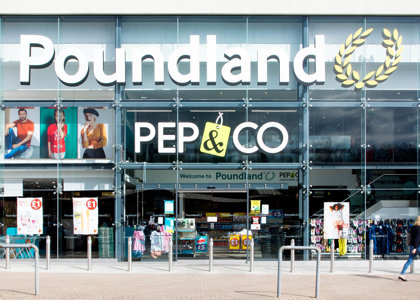
We recently went to M&S head office to catch up with our FRA alumni, Charles and Molly, who graduated from BA (Hons) Buying & Merchandising in 2018.
14th September 2021
 Back
Back
Date 27th September 2021
Fashion merchandising is one of the most essential roles in the fashion industry. Working closely with a wide range of departments, merchandisers provide valuable insights that allow businesses to make key strategic decisions to maximise sales and profits.
Fashion marketing is fast-paced and varied, making it the perfect role for those who thrive in changing and flexible work environments. Although it can be highly competitive and challenging, hard work is strongly rewarded. You might be surprised at how quickly you’re given responsibility for large budgets!
Merchandising is a fantastic career option if you’re looking for an exciting, rewarding career in fashion business.
Find out what a fashion merchandiser does, how much they earn and how you could become a fashion merchandiser.

Fashion merchandisers are responsible for getting the right products in the right store, at the right time, in the right quantities. They're in charge of shaping collections within a brand.
As a merchandiser, you’ll be involved with garments through their entire lifecycle, from initial concept to shop floor. Jackie Hutson, Vice President of Merchandising at Atrium Apparel Corporation, describes the role of a merchandiser as a “conductor, orchestrating a collection together.”
Merchandisers typically specialise in a certain product area. For large brands, you might be working in menswear, womenswear or accessories for example. However, the skills and experience are easily transferable between departments.
To be a successful merchandiser, you’ll need a deep understanding of trends, consumer behaviour and marketing; you’ll need to know exactly what customers want before they do!
You’ll work closely with a variety of different departments to maximise sales and profits for your brand. Roberta Pasciuti, Senior Merchandiser at Juicy Couture, says the aim of fashion merchandising is to "marry the design vision with the financial goals."
There are also plenty of exciting opportunities for overseas travel. You might be accompanying buyers to visit factories and suppliers in South America and South-East Asia. At a senior level, you may need to travel to find new suppliers, select products and solve problems with manufacturers.
Fashion merchandising is a highly varied and fast-paced role. Most fashion merchandisers will be based in a brand’s head office. However, travel to supplier, manufacturer and store locations may also be required.
The main responsibilities of a fashion merchandiser include:
For some smaller brands, fashion merchandising and fashion buying may be combined into one role.
I’ll never forget how proud I felt the first time I saw someone wearing something that I had a hand in making. That feeling doesn’t go away
Jackie Hutson, Vice President of Merchandising at Atrium Apparel Corporation
Fashion merchandisers work closely with buyers and designers to curate upcoming collections. Whilst it is the buyer’s responsibility to select what products to sell, merchandisers decide how many units, different styles and variations should be purchased. They also work to ensure that stock is purchased within budget.
Merchandisers also use sales data to analyse consumer behaviour to help buyers make informed purchase decisions. As a merchandiser, you'll be expected to analyse current product performance, feeding back vital information to other departments including bestselling price points, colours and styles. This will help to inform decisions about future ranges.
A large area of a fashion merchandiser's role is trend forecasting. Working closely with the buying department, fashion merchandisers will be expected to monitor current and upcoming trends in order to plan stock levels accordingly.
To do this, you'll analyse sales and performance data to see which trends are falling out of favour and which trends could be on the way up. As part of this, you might attend fashion and trade shows with the buying department. You’ll need to have a strong grasp of your brand’s demographics to be able to choose the best products for them!

Merchandisers are also in charge of setting the prices for products to optimise sales and profits, as well as planning for promotions and markdowns. You’ll be using data to forecast profits and sales for future collections, and present these to senior management. You’ll also need to keep an eye on current stock levels, reordering as required and deciding how stock is distributed amongst sales channels.
Whilst the buying team will choose what to buy, merchandisers choose how much of it to buy (following a strict budget). Merchandisers will need to build strong relationships with manufacturers and suppliers in order to effectively negotiate and maximise profits.
As a fashion merchandiser, you'll negotiate with manufacturers and suppliers to get the products made and shipped to stores within set timeframes and within a set cost. If a product is delayed, you'll be responsible for investigating why and managing any problems as they arise.
Merchandisers are required to work across multiple departments. As a merchandiser, you'll assist advertising, marketing and PR departments, providing insights into which products to promote. Sales data can also be used to help inform which products need to be reduced.
Further to this, you will be required to work with visual merchandisers, providing information that allows them to create engaging store displays that highlight key products to drive foot traffic and maximise sales.
Merchandisers are highly skilled, and you’ll need a perfect balance of creative and analytical skills to thrive. Roxanne Doyle, Fashion Merchandiser at Shop Direct, believes the key attributes for success as a merchandiser are "a positive attitude and a good work ethic."
As a merchandiser, you’ll need a confident grasp of numbers and statistics, as you’ll be using these every day in your role. You’ll be analysing sales figures, setting budgets and working with spreadsheets. As you progress, you’ll be responsible for increasingly large amounts of money. Excellent attention to detail is essential, as the smallest of errors can result in huge reductions in profit.
Charles, Fashion Retail Academy graduate and Assistant Merchandiser at M&S, says the ideal merchandiser is “reactive, adaptable and able to work under pressure. You need to always be up for a challenge, and not be afraid to question things!”
Merchandising is a dynamic and evolving environment, so you’ll need to be flexible and open to change. You’ll need to identify problems and solutions quickly. Excellent organisation skills and good time management are key. You’ll need to have a good ability to plan and prioritise your tasks.
Because merchandisers work in collaboration with many departments, you’ll need to be a strong communicator and able to develop effective working relationships. This is also important as you’ll also often be working as part of a large team! You’ll be negotiating with suppliers across the world, navigating language barriers and cultural differences.
Creativity is essential for success as a merchandiser. You’ll need fantastic trend forecasting skills and a deep understanding of what will appeal to your brand’s target audience. By understanding the entire fashion landscape, you’ll be able to accurately predict what customers want to buy and how to maximise sales and profits. Having a deep understanding of the lifecycle of a product can help avoid having to liquidate excess inventory at the end of season.
The salary of a fashion merchandiser can range from around £16,000 - £85,000+ depending on experience
Career development within fashion merchandising can be rapid for high performers. You can be in charge of a large budget and manage a team within just 5 years!
The first step in a merchandising career is usually an Allocator, Distributor or Merchandising Admin Assistant (MAA). After a few years, you can expect to progress to Merchandising Assistant. After around 7 or 8 years, you’ll rise to a Senior Merchandiser level. At the highest levels, you can progress to Head/Director of Merchandising, earning the maximum salary, plus benefits.
There's currently an extremely high demand for merchandisers in the fashion industry, with not enough candidates to fill the many roles available. This means there are lots of great opportunities for rapid progression in the sector!
When applying for merchandiser roles, it’s important to read the job description carefully. The role can vary widely between companies!
A qualification in a specialised subject is generally preferred by employers in the fashion industry. Roles are open to graduates of all disciplines but business, fashion, finance and retail-related subjects are particularly valued.
At the FRA, we have several specialist courses to choose from for those wanting to pursue a career in fashion merchandising. If you’re looking to start work as quickly as possible, you might choose our Level 4 Fast Track Buying & Merchandising diploma. You’ll learn the fundamentals of buying and merchandising in the fashion industry in just 22 weeks. This is a great choice for those already working in industry looking to retrain and move sectors.
You might choose to specialise further and study our accelerated 2-year BA (Hons) Buying & Merchandising degree. You’ll graduate faster and save money on your studies.
A fashion merchandising internship can give you practical experience in the work environment, outside of the classroom. They can also help you make industry contacts to support you throughout your career, and boost your CV with great references. While in school, Roberta advises that "you get a lot of internships, so you know exactly what to expect.”
I think it helps you to think about things differently, especially in regards to the customer
Roxanne Doyle, Fashion Merchandiser at Shop Direct
Having strong experience can help you stand out in applications and interviews, particularly an understanding of stock control levels. Many of our courses at the FRA include a three-week work placement, helping you gain the important real-world knowledge and skills you’ll need to succeed.
It can also be an advantage to have had previous experience working on the shop floor of a brand. This can demonstrate your interest in retailing to employers, and further supports your understanding of a product’s lifecycle.
Read our guide How To Get Started In The Fashion Industry for more information.
Think fashion merchandising is the right role for you? Take the first step to your dream career and study with the Fashion Retail Academy.
If you have any more questions about any of the courses on offer at The Fashion Retail Academy, send an email to info@fra.ac.uk. We’d love to hear from you!

We recently went to M&S head office to catch up with our FRA alumni, Charles and Molly, who graduated from BA (Hons) Buying & Merchandising in 2018.
14th September 2021

Congratulations to our Level 4 Fast Track Buying & Merchandising students, who graduated this month. Following our successful Bootcamp Assessment centre, a majority of our graduates are now joining the buying and merchandising teams at ASOS!
28th February 2022

Three of our Buying & Merchandising undergraduate degree students have just completed their work placements at PEP&CO!
25th October 2021